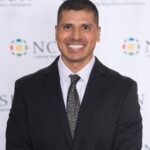
When I first came to the United States from Santiago, Chile at age 16, I brought with me a deep admiration for public health. My grandmother was a public health nurse, and from an early age, I would accompany her to clinics to see patients. Those experiences sparked my interest in nursing and shaped how I think about healthcare today, especially when it comes to men.
In my experience I’ve seen one pattern repeat across cultures and communities: men wait too long to seek care. That delay is rooted in the way many of us, especially in Latino communities, are raised to think about masculinity.
There is this persistent cultural narrative that seeking help is a sign of weakness. I’ve heard this from migrant farm workers, older adult men managing chronic conditions like diabetes and cardiovascular disease, and in my research on familism, the powerful cultural value that places family above self. When a man sees himself as the provider, any illness becomes not just a physical challenge, but a personal failure. Men feel pressure to be strong, to endure silently, and to never burden others with their pain because they see their value in what they can give, not in what they may need.
This view of masculinity isn’t just cultural, it’s reinforced by society at large. Popular media, financial stress and even viral misinformation online can all fuel a distorted view of what it means to be “a man.” Many patients come in with preconceived ideas shaped by quick videos on TikTok or headlines they’ve seen on Instagram. In some cases, they’re more likely to trust a 15-second video than a trained provider, especially when that video aligns with what they’ve been taught their whole lives: that real men don’t get sick, and if they do, they deal with it quietly.
Too many men ignore symptoms until they can no longer function. We end up seeing them in the emergency room, sometimes with late-stage cancer or uncontrolled chronic disease that could have been managed if addressed earlier. I’ve seen men delay care not because they lacked information, but because they felt shame about needing help in the first place. This internalized shame becomes a barrier to care and is often invisible to everyone but the man experiencing it.
Addressing this challenge requires both systemic change and grassroots innovation. Organizations like the Men’s Health Network (MHN) are working to transform this landscape. Founded on the recognition that men die at higher rates from nearly every major cause of death, MHN has spent decades advocating for policy changes and educational initiatives that address the unique barriers men face in accessing healthcare. They understand that effective outreach requires dismantling the cultural stigma that keeps men silent about their health concerns. They work to normalize conversations about men’s health while pushing for systemic changes that make healthcare more accessible and relevant to men’s lived experiences.
Building on this foundation, one of the most effective approaches is meeting men where they are, not just physically, but emotionally and culturally. That means creating spaces where men feel safe acknowledging their needs. It also means rewriting the narrative around masculinity so that vulnerability is recognized not as weakness, but as wisdom and as the first step toward wellness.

The Power of One: Redefining Healthcare with an AI-Driven Unified Platform
In a landscape where complexity has long been the norm, the power of one lies not just in unification, but in intelligence and automation.
At the community level, this approach takes on a deeply personal dimension. I work closely with the nonprofit called MyHealthIowa – MiSaludIowa, and through this organization, we bring care to barbershops, religious institutions, food pantries and sporting events. We train community health navigators and volunteers to empower their own communities. We provide cardiovascular screenings, diabetes checks and cancer education in places where people feel safe. If someone is never going to walk into a clinic, we have to bring the clinic to them. Health can’t begin in spaces where people feel unwelcome, unheard or invisible.
Meeting men in familiar, trusted environments creates a foundation for real conversation. In these settings, men lower their guard. They ask the questions they might never ask during a formal appointment. That comfort is critical. If we expect men to change their behavior without first changing the conditions around them, we will continue to see preventable suffering.
Taking care of yourself is how you take care of your family. We say this often in our outreach, because it reframes the narrative in a way that resonates deeply with men, especially in cultures where family is everything. Self-care isn’t self-indulgence, rather it’s service. When men prioritize their own well-being, they gain the strength and stability to continue supporting the people who depend on them. That includes being mentally present, emotionally grounded and physically well enough to provide for and protect their loved ones.
This message can be particularly powerful for men who have internalized the belief that vulnerability equals weakness. In truth, it takes strength to speak up, to ask for help and to confront illness head-on. The more we normalize those actions, the more we can shift what masculinity looks like in the context of health.
Photo: RoBeDeRo/Getty Images
Dr. Jimmy Reyes, the Assistant Dean of Enrollment and Growth Initiatives at Samuel Merritt University and a National Council of State Boards of Nursing Fellow of Regulatory Excellence, brings a wealth of expertise in nursing and public health education, regulation, health policy, and research within underserved communities, notably focusing on Latino populations and migrant communities. He earned his Bachelor of Science in Nursing, Master of Science in Nursing, Adult/Gerontology Nurse Practitioner, and Doctor of Nursing Practice degrees from the University of Iowa College of Nursing. Additionally, he obtained his Ph.D. in Gerontology from Concordia University Chicago.
Jimmy’s research endeavors have been dedicated to the development and implementation of culturally anchored, family-centered educational partnership programs aimed at enhancing diabetes self-management, with a specific emphasis on nutrition and physical activity among Latinos with diabetes in Federally Qualified Health Centers. His foundational work has paved the way for the establishment of culturally sensitive protocols and guidelines for diabetes care among Latinos in Iowa. Moreover, Jimmy has fostered collaborations with numerous healthcare professionals across the state to elevate the quality of care for Latinos with chronic conditions. Currently, he is spearheading a three-year study aimed at enhancing the capacity for self- managing chronic diseases in both Yola, Nigeria, and Des Moines, Iowa, targeting underserved, hard-to-reach, and resource-limited communities.
This post appears through the MedCity Influencers program. Anyone can publish their perspective on business and innovation in healthcare on MedCity News through MedCity Influencers. Click here to find out how.









